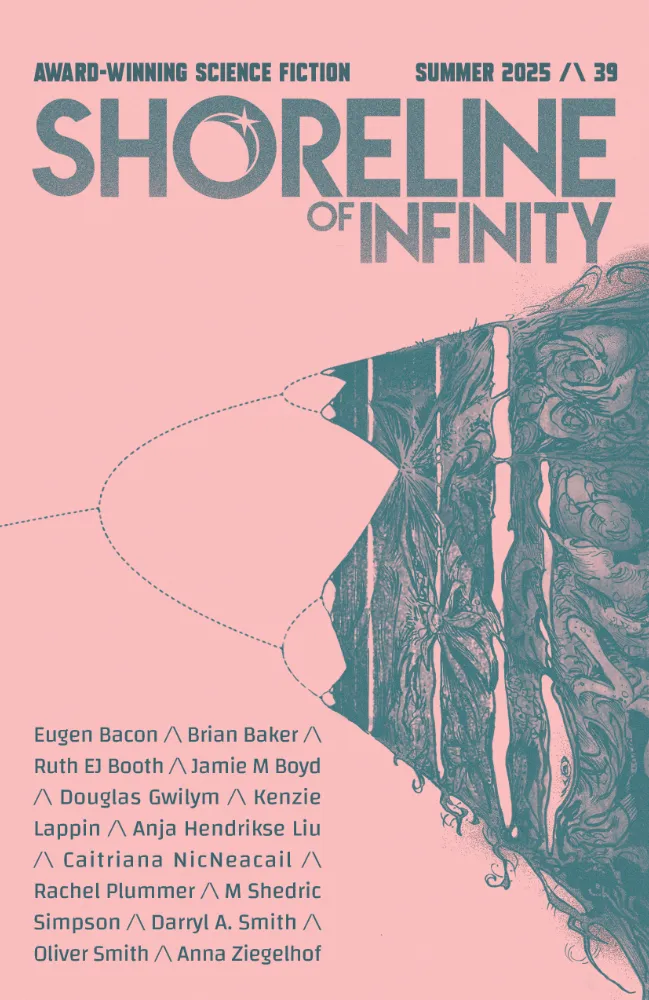Omniscient computers, ghosts in machines, and cellular communication all crop up in this edition of Shoreline, and there seems to be a loose theme of lives that take place within non-corporeal and hidden states.
The opening story, ‘Remembrance Eve‘ by Anna Ziegelhof, sets the tone. I felt dropped into an existing and complex world, in which people can share each other’s lives by having a partner’s memories implanted into their own psyches (and possibly ancestral memories as well), thus almost becoming a single person spanning two bodies. Of course, there are consequences, and the delicate balance between the real and the imagined needs sensitive treatment to avoid the loss of individual identity. A very well written, character-based story.
This is followed by ‘All You Ever Wanted‘ by Jamie M. Bond, in which a mother’s love for her daughter is challenged by modern technology. All Helen has ever wanted for her daughter is safety, but as Rebecca becomes increasingly obsessed and intertwined within the ‘verse,’ Helen starts to worry that she is losing her, especially when Rebecca decides to quit her physical body altogether and have herself uploaded, along with her virtual husband, into the network of the verse itself. This leaves the reader with questions about the nature and efficacy of bodily decay, the need for physical intimacy, and the fear of death. It’s a tender portrayal of parental love, and completely believable in this sense.
‘Yeah You, Come Here’ by Douglas Gwilym shares the theme of personalities uploaded into computer systems, but this time from a more troubled society. As the right-wing gains ground, a climate crisis beckons and society is on the verge of collapse, the message is out: abandon it and come to… where? It’s never quite explained, but the virtuality of this new world is clear.
‘These Quiet Constellations‘ by M. Shedric Simpson has similarities to the opening story, although it’s not memories that are shared in this one, but an entire community of minds. A strange sea creature, the Enneakra, has a sting that creates a state within human brains which allows them to share thoughts, to literally live as a giant mind of many beings. This has the knock-on effect that no one is able to lie anymore, as lies will always be detected within the collective. A new and better way of living for all is hoped for, but there’s only one problem, the government have made the use of Enneakra’s illegal, and those who are discovered could be forcibly removed. Thus, the posthuman dream becomes a struggle for survival. One of the best stories in this issue.
‘Kulela in the Plastocene Age’ by Darryl A. Smith is a very strange one, but my favourite. It centres on the communication between unborn and even not-yet-conceived children (dwelling within ovaries as oocyte cells), and their potential grandmother. The strange part is that the story is about predicting the amount of microplastics that will exist in offspring, and how much this will affect or shorten their lives – an urgent and highly topical issue. These unfertilised cells’ lives are mapped out in advance, but even though they are aware of it, they remain only potential children and may not be born at all. This was a fascinating exploration of life.
‘The Boss‘ by Kenzie Lappin is the light relief of this collection. A filmic, real-life escape room drama where the characters are trapped inside a factory by an AI system, and unable to leave until the ‘work is done.’ Unfortunately, the work never seems to be done, and the factory appears to have been abandoned by its crew many years ago – unbeknownst to the all-powerful computer ‘boss’. Will they work out the boss’s riddles and make it out before they starve? You’ll have to read it to find out!
‘The Love Life of Lilly Wong-Becker, Read for You by the Matrioshka Brain of Her Own Design’ by Anja Hendrikse Liu is another tale about an all-knowing computer, which tells the story of Lilly’s love life, and predicts the percentages of success with her partners, along with many other aspects of her future, possible lives. With a 99.4% success rate, Lilly trusts the system which she herself designed, and makes important decisions based on its output; but when it comes to her one-time lover, Dawes, Lilly must decide whether to follow her human instinct or continue to trust in the AI system. Delightful.
‘The Lost’ by Brian Baker is a rather disjointed tale about a real ghost in a real machine, in this case a 1960s short wave radio transmitter/receiver picking up the distress call of a Russian woman from many years before. I enjoyed the characterization very much but must admit to being a little confused by the content (maybe you can work it out and post your explanation below).
And finally, ‘Dark Matter‘ by Caitriana NicNeacail, a physics-based tale about a scientist investigating supersymmetry, the idea that particles have parallel opposites, and how this plays into theories of the possible parallel lives of humans spiralling out from all the different decisions we can make, creating a kind of life-path multiverse. The added intrigue is the particles appear to be chatting with each other. Dark Matter won the 2025 Cymera Festival/Shoreline of Infinity Short Story Competition for Scottish Writers, and I can certainly see why. It’s innovative and manages to explain the science in a way the general reader can understand, as well as being a captivating narrative.
These are all personal, intimate stories which present the inner lives of their characters rather than sweeping, epic SciFi tales – but they are certainly better for it.


Leave a Reply